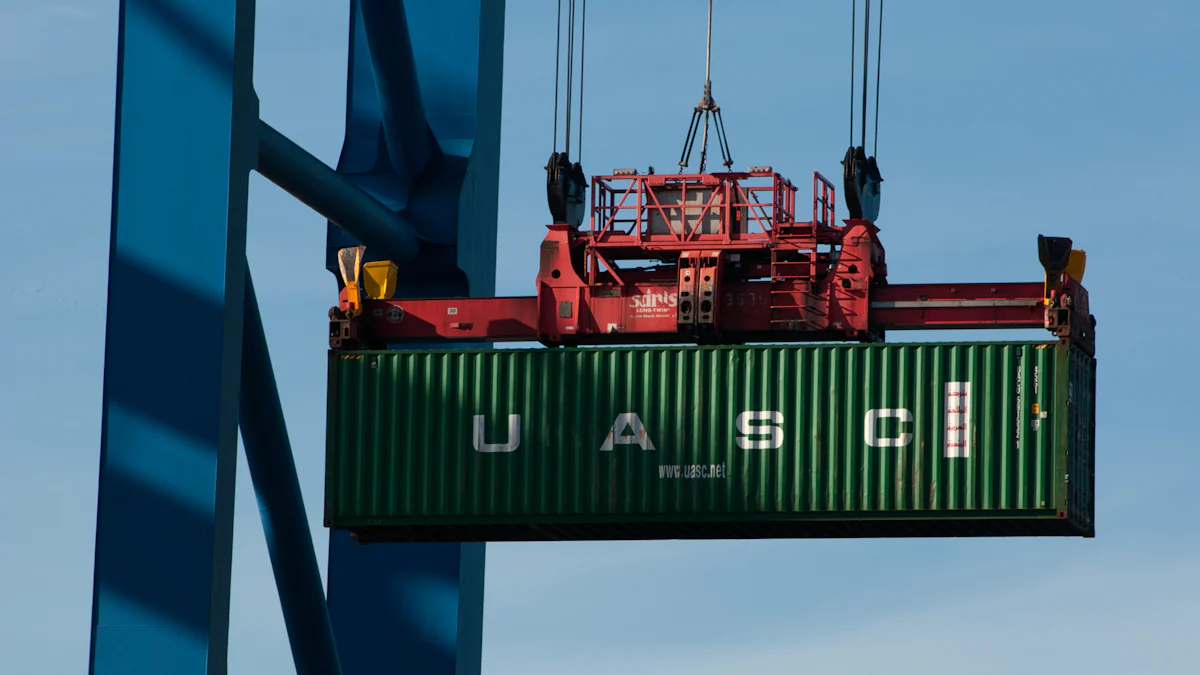10 Tips for Cost-Effective International Freight Shipping

Cost-effective shipping plays a crucial role in global trade. Shipping accounts for around 80% of international trade volume. Businesses face challenges in international freight shipping. These include fluctuating fuel prices and complex regulations. Efficient freight international services can help overcome these hurdles. Optimizing shipping costs becomes essential for maintaining competitiveness. Companies must explore strategies to reduce expenses without compromising service quality. By understanding the dynamics of global trade, businesses can unlock opportunities for growth.
Understanding Freight International Services

Freight international services play a pivotal role in global trade. Businesses rely on these services to transport goods across borders efficiently. Different types of freight services cater to various needs and preferences.
Types of Freight International Services
Air Freight
Air freight offers the fastest shipping method for international cargo. Businesses choose air freight for time-sensitive shipments. The cost of air freight is higher compared to other methods. However, the speed and reliability often justify the expense.
Sea Freight
Sea freight provides a cost-effective solution for large volumes of goods. Businesses use sea freight for shipments with longer lead times. The lower cost per unit makes sea freight an attractive option. Ocean freight is ideal for bulk shipments and heavy cargo.
Rail Freight
Rail freight combines speed and cost-effectiveness for land transportation. Businesses utilize rail freight for long-distance inland shipping. Rail freight offers a balance between air and road freight. This method reduces carbon emissions compared to road transport.
Road Freight
Road freight delivers flexibility and accessibility for short distances. Businesses prefer road freight for local and regional deliveries. The convenience of door-to-door service enhances its appeal. Road freight supports last-mile delivery in supply chains.
Benefits of Each Freight Solution
Speed and Efficiency
Air freight leads in speed, ensuring quick delivery of urgent shipments. Rail freight offers a faster alternative to road transport for long distances. Sea freight provides efficiency for large volumes over extended periods. Road freight excels in delivering goods directly to destinations.
Cost Considerations
Sea freight stands out as the most cost-effective for bulk shipments. Rail freight offers competitive pricing for inland transport. Air freight incurs higher costs but provides unmatched speed. Road freight balances cost and convenience for shorter routes.
Environmental Impact
Rail freight reduces environmental impact with lower emissions than road transport. Sea freight also contributes to sustainability with energy-efficient vessels. Air freight has a higher carbon footprint due to fuel consumption. Road freight impacts the environment based on vehicle type and distance.
Freight international services offer diverse options to meet business needs. Understanding these services helps optimize logistics strategies. Businesses can choose the best method based on speed, cost, and environmental factors.
Steps to Reduce Shipping Costs

Reducing shipping costs requires a strategic approach. Effective freight international services demand careful evaluation and optimization. Implementing these steps can lead to significant savings.
Evaluate Current Shipping Practices
Evaluating current shipping practices is crucial. Businesses must analyze shipping routes to identify inefficiencies. Route optimization can reduce transportation costs by an average of 15%. Real-world case studies highlight the importance of strategic route planning. Businesses should assess carrier performance regularly. Monitoring carrier reliability ensures timely deliveries and cost-effectiveness.
Analyze Shipping Routes
Shipping routes play a vital role in cost management. Businesses must examine existing routes for potential improvements. Identifying shorter or more efficient paths reduces fuel consumption. Optimized routes contribute to lower operational expenses. Freight international services benefit from streamlined logistics.
Assess Carrier Performance
Carrier performance impacts shipping costs significantly. Businesses should evaluate carriers based on delivery times and service quality. Regular assessments help identify underperforming carriers. Switching to more reliable partners enhances efficiency. Freight international services thrive with dependable carriers.
Optimize Packaging and Weight
Optimizing packaging and weight offers substantial savings. Freight international services benefit from reduced shipping costs through effective packaging strategies.
Use Lightweight Materials
Lightweight materials minimize shipping expenses. Businesses should consider alternative packaging options. Reducing package weight decreases transportation costs. Lighter shipments result in lower fuel usage. Freight international services become more economical with optimized packaging.
Consolidate Shipments
Consolidating shipments maximizes efficiency. Combining multiple orders into a single shipment reduces costs. Bulk shipping leverages economies of scale. Freight international services achieve cost-effectiveness through consolidation. Businesses can negotiate better rates with carriers for larger volumes.
Tender Procedures and Negotiations
Tender procedures and negotiations play a critical role in cost reduction. Businesses must approach these processes strategically to optimize freight international services.
Request for Proposals (RFP)
Request for Proposals (RFP) facilitates competitive pricing. Businesses should invite multiple carriers to submit proposals. Comparing offers allows for informed decision-making. RFPs ensure transparency and fair competition. Freight international services benefit from cost-effective contracts.
Negotiating with Carriers
Negotiating with carriers requires skill and preparation. Businesses should leverage shipment volumes for better rates. Establishing long-term partnerships fosters mutual benefits. Effective negotiation leads to favorable terms and conditions. Freight international services become more affordable through strategic negotiations.
Exploring Business Models
Businesses must choose the right shipping model to optimize freight international services. Each model offers unique advantages and challenges. Understanding these models helps businesses make informed decisions.
Direct Shipping
Direct shipping involves sending goods directly from the supplier to the customer. This model eliminates intermediaries in the supply chain. Businesses often use direct shipping for time-sensitive deliveries.
Pros and Cons
Direct shipping provides faster delivery times. Businesses benefit from reduced handling and storage costs. Direct shipping enhances customer satisfaction with quicker service. However, direct shipping may lead to higher transportation expenses. Businesses face challenges in managing logistics without third-party support.
Third-Party Logistics (3PL)
Third-party logistics (3PL) providers manage logistics operations for businesses. 3PL companies offer expertise in freight international services. Businesses rely on 3PL providers for efficient supply chain management.
Benefits of 3PL
3PL providers offer cost savings through economies of scale. Businesses gain access to advanced technology and logistics networks. 3PL companies provide flexibility in managing fluctuating demand. Freight international services improve with enhanced service levels. However, businesses may experience challenges with communication and control. Dependency on 3PL providers can lead to hidden costs and compatibility issues.
Unknown, Logistics Expert: "While third-party logistics (3PL) offers several advantages, including expertise, cost savings, flexibility, and enhanced service levels, it also presents challenges such as loss of control, communication issues, dependency, hidden costs, and compatibility issues."
JUSDA Solutions
JUSDA Supply Chain Management International Co., Ltd. offers comprehensive freight international services. JUSDA integrates advanced technology to streamline logistics operations. Businesses benefit from JUSDA's innovative supply chain solutions.
Overview of JUSDA Services
JUSDA provides end-to-end supply chain management. The company offers multimodal transportation and warehousing services. JUSDA supports cross-border logistics and e-commerce distribution. The JusLink platform enables real-time collaboration and decision-making. Businesses leverage JUSDA's global network for efficient logistics.
Cost Benefits of Using JUSDA
JUSDA offers competitive pricing for freight international services. Businesses achieve cost savings through optimized routing and scheduling. JUSDA's expertise reduces operational expenses and enhances efficiency. The company's advanced technology supports precise business decisions. Businesses benefit from JUSDA's ability to handle complex supply chain demands.
Freight international services require careful consideration of business models. Direct shipping and 3PL offer distinct advantages and challenges. JUSDA provides a reliable solution for comprehensive supply chain management. Businesses must evaluate their needs to choose the best model for success.
Freight international services offer numerous strategies to enhance cost-effectiveness. Implementing these tips can lead to better efficiency in your shipping operations. Evaluate current practices and optimize packaging to reduce expenses. Consolidate shipments and negotiate with carriers for favorable rates. Choose the right business model for your needs. Strategic planning plays a crucial role in achieving success in freight international services. Set clear goals and allocate resources effectively. Adapt strategies to the changing industry landscape. Embrace strategic planning to unlock growth opportunities in the fast-paced world of shipping.
See Also
Unlocking Cost Savings: Expert Tips for Supply Chain Optimization
Reducing Supply Chain Costs: A Comprehensive Handbook
The Financial Aspect of Optimizing Supply Chain Expenses
Avoiding Overpayment: Strategies for Cutting Supply Chain Costs
Exploring 5 Cutting-Edge Strategies for Supply Chain Efficiency
